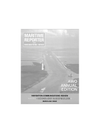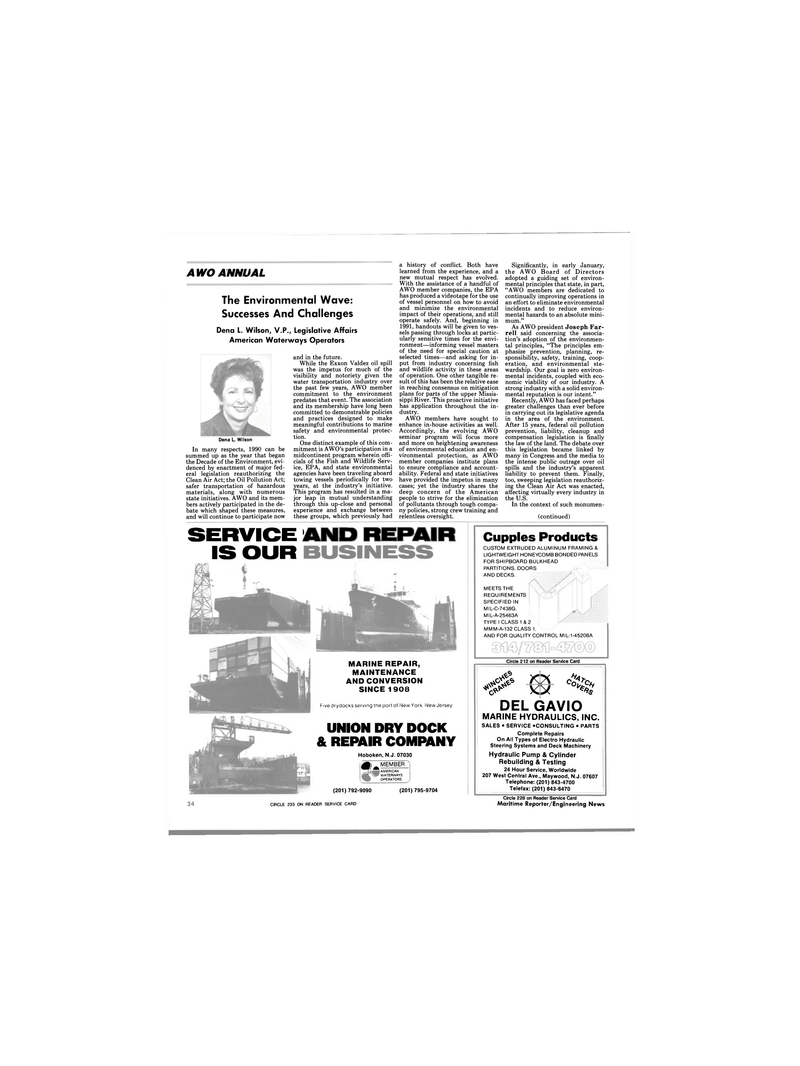
Page 23: of Maritime Reporter Magazine (March 1991)
Read this page in Pdf, Flash or Html5 edition of March 1991 Maritime Reporter Magazine
A WO ANNUAL
The Environmental Wave:
Successes And Challenges
Dena L. Wilson, V.P., Legislative Affairs
American Waterways Operators
Dena L. Wilson
In many respects, 1990 can be summed up as the year that began the Decade of the Environment, evi- denced by enactment of major fed- eral legislation reauthorizing the
Clean Air Act; the Oil Pollution Act; safer transportation of hazardous materials, along with numerous state initiatives. AWO and its mem- bers actively participated in the de- bate which shaped these measures, and will continue to participate now and in the future.
While the Exxon Valdez oil spill was the impetus for much of the visibility and notoriety given the water transportation industry over the past few years, AWO member commitment to the environment predates that event. The association and its membership have long been committed to demonstrable policies and practices designed to make meaningful contributions to marine safety and environmental protec- tion.
One distinct example of this com- mitment is AWO's participation in a midcontinent program wherein offi- cials of the Fish and Wildlife Serv- ice, EPA, and state environmental agencies have been traveling aboard towing vessels periodically for two years, at the industry's initiative.
This program has resulted in a ma- jor leap in mutual understanding through this up-close and personal experience and exchange between these groups, which previously had a history of conflict. Both have learned from the experience, and a new mutual respect has evolved.
With the assistance of a handful of
AWO member companies, the EPA has produced a videotape for the use of vessel personnel on how to avoid and minimize the environmental impact of their operations, and still operate safely. And, beginning in 1991, handouts will be given to ves- sels passing through locks at partic- ularly sensitive times for the envi- ronment—informing vessel masters of the need for special caution at selected times—and asking for in- put from industry concerning fish and wildlife activity in these areas of operation. One other tangible re- sult of this has been the relative ease in reaching consensus on mitigation plans for parts of the upper Missis- sippi River. This proactive initiative has application throughout the in- dustry.
AWO members have sought to enhance in-house activities as well.
Accordingly, the evolving AWO seminar program will focus more and more on heightening awareness of environmental education and en- vironmental protection, as AWO member companies institute plans to ensure compliance and account- ability. Federal and state initiatives have provided the impetus in many cases; yet the industry shares the deep concern of the American people to strive for the elimination of pollutants through tough compa- ny policies, strong crew training and relentless oversight.
Significantly, in early January, the AWO Board of Directors adopted a guiding set of environ- mental principles that state, in part, "AWO members are dedicated to continually improving operations in an effort to eliminate environmental incidents and to reduce environ- mental hazards to an absolute mini- mum."
As AWO president Joseph Far- rell said concerning the associa- tion's adoption of the environmen- tal principles, "The principles em- phasize prevention, planning, re- sponsibility, safety, training, coop- eration, and environmental ste- wardship. Our goal is zero environ- mental incidents, coupled with eco- nomic viability of our industry. A strong industry with a solid environ- mental reputation is our intent."
Recently, AWO has faced perhaps greater challenges than ever before in carrying out its legislative agenda in the area of the environment.
After 15 years, federal oil pollution prevention, liability, cleanup and compensation legislation is finally the law of the land. The debate over this legislation became linked by many in Congress and the media to the intense public outrage over oil spills and the industry's apparent liability to prevent them. Finally, too, sweeping legislation reauthoriz- ing the Clean Air Act was enacted, affecting virtually every industry in the U.S.
In the context of such monumen- (continued)
SERVICE
IS OUR
AND REPAIR Cupples Products
CUSTOM EXTRUDED ALUMINUM FRAMING &
LIGHTWEIGHT HONEYCOMB BONDED PANELS
FOR SHIPBOARD BULKHEAD
PARTITIONS, DOORS
AND DECKS.
MEETS THE
REQUIREMENTS
SPECIFIED IN
MIL-C-7438G,
MIL-A-25463A
TYPE I CLASS 1 & 2
MMM-A-132 CLASS 1,
AND FOR QUALITY CONTROL MIL-1-45208A £ MEMBER N
AMERICAN
WATERWAYS
OPERATORS
Circle 212 on Reader Service Card <£> 0 ^ DEL GAVIO
MARINE HYDRAULICS, INC.
SALES • SERVICE 'CONSULTING • PARTS
Complete Repairs
On All Types of Electro Hydraulic
Steering Systems and Deck Machinery
Hydraulic Pump & Cylinder
Rebuilding & Testing 24 Hour Service, Worldwide 207 West Central Ave., Maywood, N.J. 07607
Telephone: (201) 843-4700
Telefax: (201) 843-6470
Circle 228 on Reader Service Card
Maritime Reporter/Engineering News
UNION DRY DOCK & REPAIR COMPANY
Hoboken, N.J. 07030 (201) 792-9090 (201) 795-9704
CIRCLE 233 ON READER SERVICE CARD
MARINE REPAIR,
MAINTENANCE
AND CONVERSION
SINCE 1908
K ive drydocks serving the port of New York New Jersey

 22
22

 24
24
